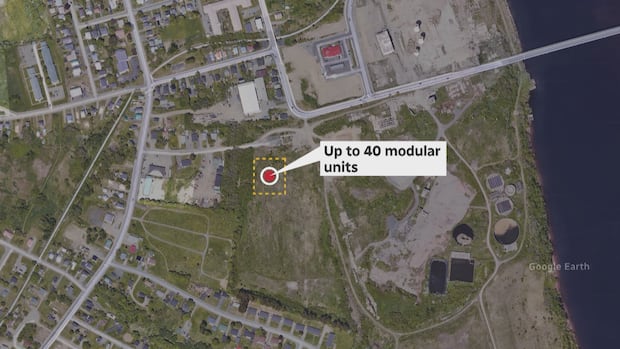New BrunswickThe homeless population in the northern city of Bathurst has been growing in recent years, the mayor and the manager of the local food bank say.Between 28 and 40 units will be placed on part of the property for one yearVictoria Walton · CBC News · Posted: Nov 15, 2025 5:00 AM EST | Last Updated: 2 hours agoListen to this articleEstimated 5 minutesThe audio version of this article is generated by text-to-speech, a technology based on artificial intelligence.The modular units will be placed on a portion of the former Smurfit Stone Mill land, at the corner of Murray Ave. and Bridge Street in Bathurst. (CBC)A temporary zoning change to allow up to 40 modular housing units on the former Smurfit-Stone property in Bathurst has been approved by the city’s planning advisory committee.The units will provide shelter for residents who are homeless or precariously housed and will be run by the Chaleur Regional Service Commission.“That was the last of the big administrative hurdles that led to the development of this project,” said Jennifer Pitre, director of community development with the commission.”So now we can really move forward with purchasing these pods and getting things operational on site.”Between 28 and 40 modular units will be placed on the site for one year. The exact number depends on the cost of the units, Pitre said.WATCH | ‘We want to get things up off the ground and running as quickly as possible’:Modular housing coming to Bathurst for people struggling with homelessnessThe Bathurst planning advisory committee has approved using land on the former Smurfit-Stone mill site for up to 40 modular housing units next year.“We’re waiting for the proposals to come back to determine how much they’re going to cost individually. … In a perfect world, we’ll be able to get all 40.”The precise designs will depend on the proposals the commission receives, but the units will be pre-fabricated, each with at least a bed, desk and its own entry. Some configurations include a washroom in each unit, while others have shared washrooms. The Chaleur Regional Service Commission currently operates a 10-bed shelter in Bathurst, which will close once the modular units open on the former mill property. Jennifer Pitre of the Chaleur Regional Service Commission says the exact number of units will be determined by the cost. (Victoria Walton/CBC)Pitre said that shelter is full every night. The most recent count found that about 40 chronically homeless people were living on the street in the northern New Brunswick city, and another 40 were “extremely precariously housed.”Once the new development is up and running, at least two staff will be on site at all times, offering wraparound services such as counselling and helping people work toward long-term housing options.“We’ll have residential support workers, people who can connect the clients to the community, resources for people who are looking to work on a housing plan and then find sustainable housing for themselves,” Pitre said. “That’ll all be available on site.”Growing need in Bathurst areaBathurst Mayor Kim Chamberlain said she’s seen the population of homeless people in the area grow significantly in the past five or so years.“Homelessness is definitely a file, where in 2021 we barely had any. And today, we are in this situation,” Chamberlain said.Mayor Kim Chamberlain attributes the growing number of homeless people in Bathurst to the increased cost of living. (Victoria Walton/CBC)“We did not have a lot of the homeless encampments, or sleeping in tents. But it’s the reality, you know, cost of living and everything else that has increased.”Michel Godin, manager of the Bathurst Volunteer Centre, agreed. The centre has operated a soup kitchen and food bank for more than 30 years.“The food bank right now is probably the highest it’s ever been. We are serving over 500 families monthly. We help approximately 80 to 90 people with lunch at our soup kitchen every day.”Michel Godin, who manages the Bathurst Volunteer Centre, says the number of people dealing with homelessness in Bathurst is growing. (Réal Fradette/Radio-Canada)Godin said the site for the new housing is centrally located, so people living in the modular units will still be able to access the soup kitchen, which he expects will have a positive effect.“The important part of the plan is there would be wraparound services to ensure that people who want help and want to get out of homelessness, you know, can follow steps and find a way out and stay housed once they are,” Godin said.Positive reaction so farThe Chaleur Regional Service Commission held a public information session for the wider Bathurst community, the reaction from residents was generally supportive.“Of course some people have concerns, but the NIMBYism isn’t terribly strong,” she said. Pitre said she herself lives only six houses away from the site.“I’m that confident in my team and in the structure of the policies, the procedures, and I believe enough in the project and what it is that we’re doing that I’m building it in my own backyard,” she said.A mock-up from the Chaleur Regional Service Commission shows the location where the modular units will be, but Pitre says the depicted configuration may change. (Chaleur Regional Service Commission)The site will include security cameras, and will be surrounded by a fence. There’s also a “good neighbour plan” to ensure residents respect things such as quiet hours and the need to keep the site clean.Pitre said that after the one-year zoning allowance is up, she hopes the modular units will find a permanent home somewhere else in the city.There is already a request for proposals for the units themselves, which Pitre hopes can be open by late 2025 or early 2026. “The timeline to get these open for us, of course, is yesterday, and as soon as possible,” Pitre said. “But we’re still at the mercy of the contractors who will be building these units and having them installed.”
Former Bathurst mill land approved for modular housing for homeless people











